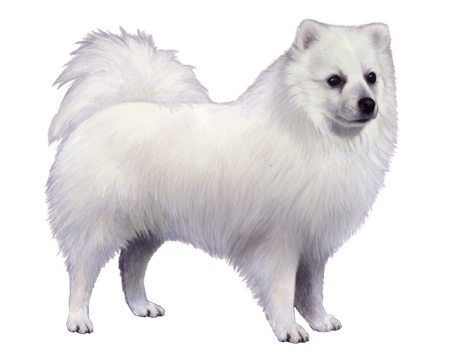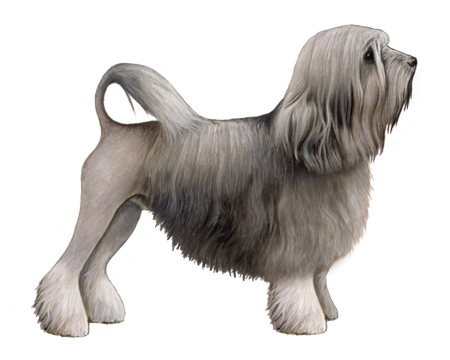
Nordic Spitz
Nordic Spitz are alert, confident, and daring dogs. These qualities make them excellent watchdogs—and their affectionate, loyal, and devoted natures make them great family pets as well.
Interested in discovering if your dog is a Nordic Spitz?
Check out Wisdom Panel's DNA tests.

Nordic Spitz Traits
General Appearance
Nordic Spitz are small spitz-type hounds with compact, well-muscled bodies, calm, keen expressions, and bold, daring demeanors.
Coat and Colouring
Like other breeds from the region, the Nordic Spitz has a double coat consisting of a fine, dense undercoat and a topcoat with hard, short, and straight hair. The hair is shortest on the bridge of its nose, top of the skull, ears, and fronts of its legs. Longer hair covers its neck, backs of its thighs, and underside of its tail.
Nordic Spitz are pure white with a "mask" covering the sides of their heads and ears and well-defined, often large patches of color, ideally in shades of red or yellow.
Distinctive Physical Traits
Nordic Spitz are compact and slightly rectangular in appearance. Though not bulky, the breed has well-developed muscles and slight angulation in their features, giving them rugged but graceful proportions. The breed has a short muzzle, high set and erect ears, and medium-sized, almond-shaped, brown eyes. Their tails are high set and carried in a high curve.
Nordic Spitz Temperament
Nordic Spitz are keen, attentive, and self-confident dogs when working and calm and affectionate companions at home.
The breed is known for its fearless attitude. It used its keen senses to hunt forest game and alert hunters to its location with high-pitched vocalizations. That strong hunting drive remains, so the Nordic Spitz is likely to chase small pets. However, it's not considered an aggressive breed and may get along well with other pets if introduced properly.
Nordic Spitz tend to bark when excited, so they don't do well in apartments.


Nordic Spitz History
The Nordic Spitz—also known as Norrbottenspitz or Norrbottenspets—is an ancient breed from the Nordic regions of Sweden and Finland. These little dogs survived the harsh northern climate while hunting small animals that their owners then sold or traded.
Fur prices dropped following World War II, and demand for these tenacious hunting dogs declined, too. In 1948, the Swedish Kennel Club declared the Nordic Spitz extinct. It closed its studbooks, but the breed survived in remote villages where the dogs continue to work as watchdogs and companion animals.
Thanks to dedicated breeders, the Nordic Spitz returned to the Swedish Kennel Club—complete with a new breed standard—less than two decades later. The population remains small, with fewer than 3,000 Nordic Spitz living in Scandinavia and small numbers in the rest of the world.
Nordic Spitz Care
Nutrition
Nordic Spitz require high-quality dog food that's appropriate for their activity level and life stage (e.g., puppy, adult, senior).
All dogs run the risk of obesity if they eat too many calories. Portion out their food in a measuring cup and limit treats to no more than 10% of their daily calories to keep them from becoming overweight.
Grooming
Nordic Spitz have minimal grooming needs. Most of the year, all they need is an occasional bath and brushing. During the spring and fall, they "blow" their coats and require daily brushing to help remove their dead undercoats.
In addition to regular ear cleaning and nail trims, start a dental care routine. Brushing your dog's teeth in between professional dental cleanings is part of a good dental hygiene program.
Exercise
Nordic Spitz are built to race through the woods during a hunt. These days, they might spend more time chasing tennis balls than small animals, but they're still an active breed that requires a lot of exercise.
Regular walks or fast-paced, outdoor games (in a fenced yard) can help burn off their energy. This agile, active breed also has the stamina to tag along for outdoor activities like hiking and swimming. Rally, agility, flyball, and competitive obedience are other great activities for them to try.
These so-called "weatherproof" dogs were raised in harsh climates and have double coats that protect them from the elements. That means these pups are up for activities in all kinds of weather.
Training
Training is essential for these agile and attentive dogs. Regular sessions will establish positive habits and provide much-needed physical and mental stimulation. Games and puzzles will also appeal to this intelligent breed.
The Nordic Spitz likes activities that are fast-paced and interesting. Skip repetitive training sessions and keep it fun and upbeat.
This breed may be quick to learn, but don't expect training to get their barking under control. These dogs like to "talk," and that innate behavior will be hard to train away. Even in the show ring where rules are strict, judged don't penalize Nordic Spitz for their frequent barking.
Use positive, reward-based training, offering treats, toys, and praise instead of harsh criticism. Regular socialization can also help the Nordic Spitz feel confident with unfamiliar people, pets, and situations.
Nordic Spitz Genetic Health Conditions
-
Progressive Early-Onset Cerebellar Ataxia
Progressive early-onset cerebellar ataxia is a disorder of the nervous system that causes ataxia (uncoordinated movements) and loss of balance.
Knowing if your Nordic Spitz is a carrier or at-risk for these conditions can help you and your veterinarian plan for your pup's lifelong care. With Wisdom Panel™ Premium, you can get results for over 200 genetic health tests.
Breed Group
Companion
This group consists of dogs typically bred for the specific purpose of human companionship, and many are popular pets because of their gentle nature. They became more common as the concept and luxury of dogs as pets prevailed.



























_Color.png)










